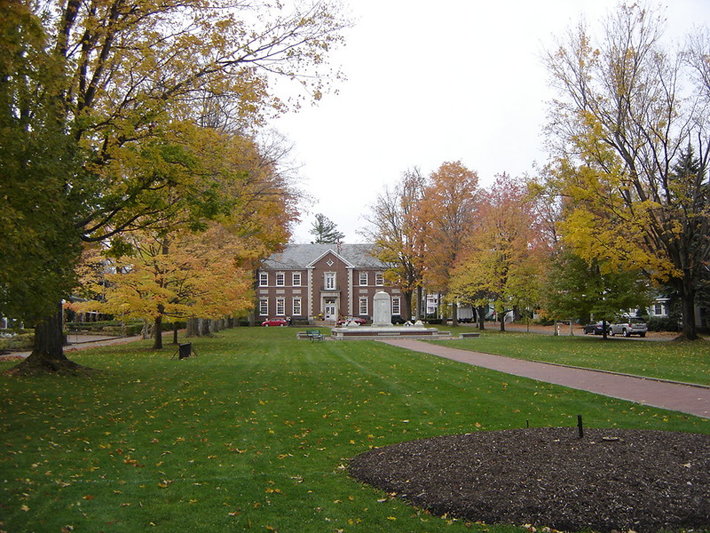When a knife-wielding man stabbed acclaimed author Salman Rushdie as he prepared for a talk at the Chautauqua Institution in New York on August 12, it was also an attack on the very purpose of the program.

None of those gathered at the retreat could have suspected that one among them would use this occasion to carry out the 1989 fatwa imposed by the late Ayatollah Ruhollah Khomeini calling for Rushdie’s execution over perceived blasphemy in his 1988 novel The Satanic Verses.
How ironic that the talk Rushdie was about to deliver when he was attacked was to be a discussion of how the United States has been a sanctuary for exiled writers and artists.
The New York Times, in its coverage of the incident, voiced concern about the effect of this premeditated violence on the Chautauqua movement. It would be sad indeed if the long and illustrious history of Chautauqua as a religious and cultural haven were to be overshadowed or redefined by this in the public eye.
It is a history well worth remembering.
Founded in 1874, Chautauqua has remained true to its original purpose: The free exchange of ideas, knowledge and culture, expressed through speech and the written word. These principles are at the heart of Chautauqua’s social mission. In fact, the institution, located on the banks of Chautauqua Lake, some 70 miles south of Buffalo, has pioneered adult education, based on the belief that all deserve access to what has come to be known as “life-long learning.”
Chautauqua has remained largely unchanged except in one aspect: After beginning as a Methodist retreat, it rapidly evolved into a community for other Protestant denominations, and Chautauqua today is home to many faith groups, represented by an array of chapels, temples and buildings.
Advocates of its social mission sometimes referred to it as the “Chautauqua Ideal.” And it is a testament to the power and influence of that ideal that it quickly spread beyond southwestern New York to communities as far away as Ohio, Michigan and Colorado, which formed their own Chautauqua groups.
The early 1900s saw the creation of hundreds of touring Chautauquas that brought an entirely new form of cultural enrichment to communities through lectures, dance, music and drama. Audiences around the country might be treated to talks by such luminaries as Mark Twain and suffragette Susan B. Anthony, or a play based on Charles Dickens’ novel The Tale of Two Cities. Teddy Roosevelt, the nation’s 26th president, once referred to traveling Chautauquas as “the most American thing in America.”
“What drew people to every incarnation of Chautauqua around the turn of the century was the promise of transformation, self-improvement and a sense of uplift,” wrote Charlotte M. Canning, a drama professor at the University of Texas at Austin, in a recent article. “Whether a person traveled to New York or experienced Chautauqua in their own backyard, they felt that knowledge and self-expression were theirs for the taking.”
Among the few Chautauquas that still survive is the Colorado Chautauqua in Boulder in a National Historic Landmark on the outskirts of the city near the University of Colorado. Here, Chautauqua’s cultural and educational programs attract more than a million visitors annually.
The attempt on Rushdie’s life shattered the calm at Chautauqua Institution. The New York Times voiced concern lest it change Chautauqua’s trajectory leading longtime guests to “question what would become of a retreat that seemed like a rare haven from modern life” and “an intellectual melting pot.”
The attack on Rushdie nearly took the life of the 75-year-old author. His road to recovery has begun but his injuries, though not fatal, were extremely severe.
It is hoped by those who value the Universal Declaration of Human Rights including the freedom of expression and the right to life that Rushdie recovers fully from this attack and that Chautauqua remains true to its purpose and heritage.
_______________
From its beginnings, the Church of Scientology has recognized that freedom of religion is a fundamental human right. In a world where conflicts are often traceable to intolerance of others’ religious beliefs and practices, the Church has, for more than 50 years, made the preservation of religious liberty an overriding concern.
The Church publishes this blog to help create a better understanding of the freedom of religion and belief and provide news on religious freedom and issues affecting this freedom around the world.
The Founder of the Scientology religion is L. Ron Hubbard and Mr. David Miscavige is the religion’s ecclesiastical leader.
For more information visit the Scientology website or Scientology Network.


